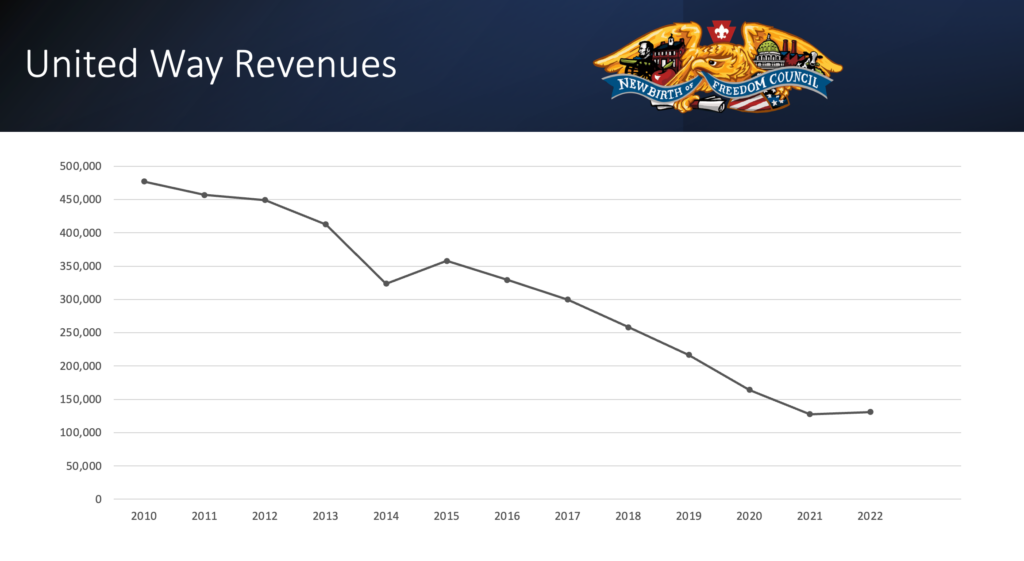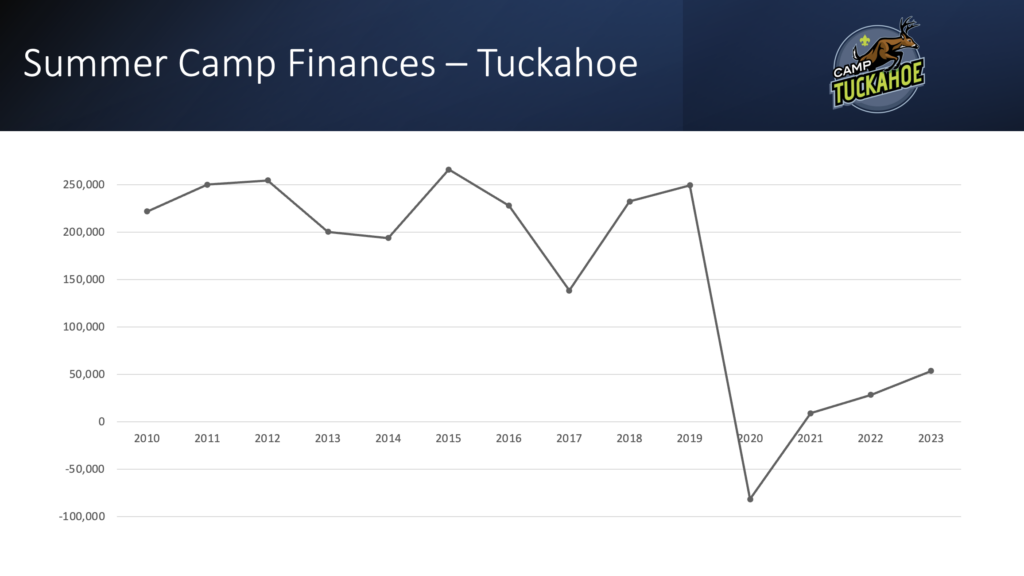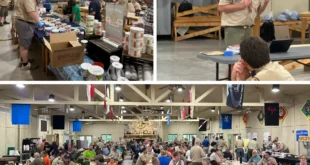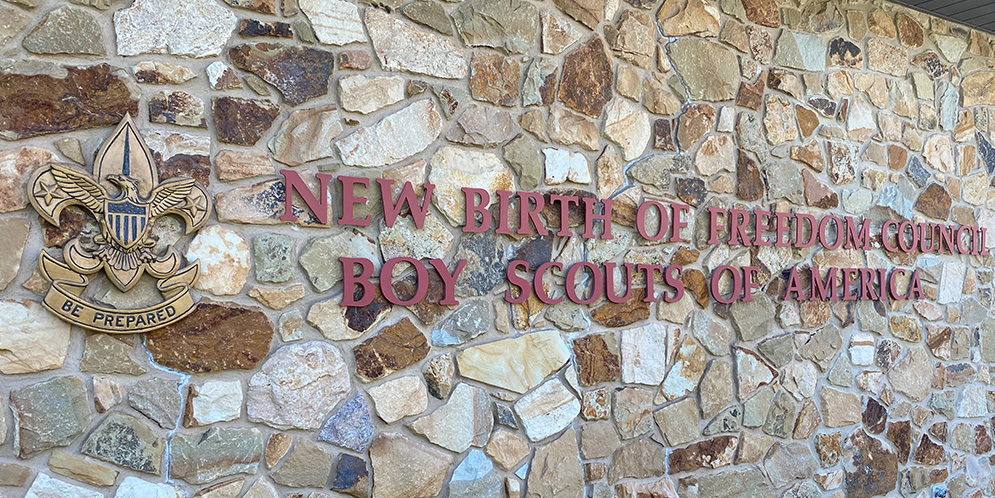 At the Council’s Program Launch event on June 1, Council President Jan Wagner and Immediate Past Council President Matt Haar presented our Council’s current financial challenges, including a detailed look at the financial side of our Council’s camping operations. Given the importance of this information and the current and potential future impacts of this situation, we wanted to make this information available to all our stakeholders.
At the Council’s Program Launch event on June 1, Council President Jan Wagner and Immediate Past Council President Matt Haar presented our Council’s current financial challenges, including a detailed look at the financial side of our Council’s camping operations. Given the importance of this information and the current and potential future impacts of this situation, we wanted to make this information available to all our stakeholders.
Our council’s youth membership has declined sharply due to the challenges created by the COVID-19 pandemic. That decline in youth membership has financial implications for the Council, most notably when we look closely at the financial results from our camping operations.
We want to share with you the Council’s financial results dating back to the formation of the New Birth of Freedom Council, which was created in 2010 through the merger of the legacy Keystone Area and York-Adams Area councils. This longer view of our Council’s financial matters will help provide you with a historical context over the years.
Operating Budget Results Over Time
During the pandemic, our Council received significant financial support from the federal government’s Payroll Protection Plan and the Employee Retention Tax Credit programs. We also benefitted from a $500,000 pandemic insurance policy we took out with Lloyds of London. These three revenue sources helped our Council avoid major staff layoffs and other draconian budget cuts. As you can see from the graph below, our Council’s financial “bottom line” has varied considerably over the past 12 years.
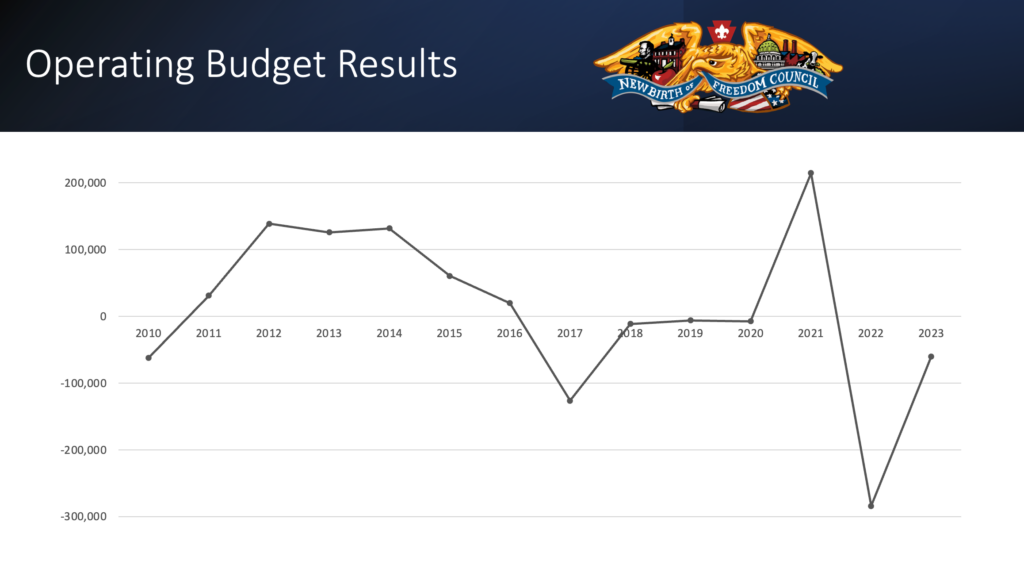 When COVID first hit in 2020, government support and that insurance policy allowed us almost to break even that year. With COVID relief funds from the federal government, the Council experienced a $214,646 surplus in 2021. We wanted to defer some COVID relief dollars into 2022, but accounting standards wouldn’t allow that. In 2022, the Council recorded a $283,712 operating deficit, and how that came to be is important for us to share, especially because it concerns our two camps, Hidden Valley and Camp Tuckahoe.
When COVID first hit in 2020, government support and that insurance policy allowed us almost to break even that year. With COVID relief funds from the federal government, the Council experienced a $214,646 surplus in 2021. We wanted to defer some COVID relief dollars into 2022, but accounting standards wouldn’t allow that. In 2022, the Council recorded a $283,712 operating deficit, and how that came to be is important for us to share, especially because it concerns our two camps, Hidden Valley and Camp Tuckahoe.
A Changing Financial Model
Over time, significant sources of funding for local councils have evolved. Our Council is no exception. One example of this evolution is the decline in support from local United Ways. For decades, local United Ways invested significantly in our programs. But that’s no longer the case as local United Ways have prioritized their funding elsewhere, as is their prerogative. Our point is not to criticize this decision, only to share the reality that this funding is no longer available.
Only the United Way of York County still allocates to our Council. Unfortunately, we anticipate this allocation will likely disappear over the next two years as the United Way of York County has also announced a change in its funding priorities. As the graph below reflects, net income from local United Ways has declined from $476,914 to $131,008 from 2010-2022. While our fundraising has grown significantly in recent years, it has been difficult to keep up with the pace of lost revenues from the United Ways. ** The impact of the pandemic on our membership and summer attendance hasn’t helped either.
Summer Camp Attendance & Financial Results
In looking at summer camp attendance and the financial performance of our camping operations, please keep in mind the declines in the Council’s membership referenced earlier. While membership declined across the board in all Scouting programs, Cub Scout membership was impacted most severely in the immediate short run. Those losses then impact the Scouts BSA program a year or so later when those Cub Scouts should have been crossing over to Scouts BSA.
Looking at Hidden Valley’s overall summer camp attendance, the 629 Scouts camping at Hidden Valley in 2022 marked a new low dating back to the 2010 merger (see graph below).
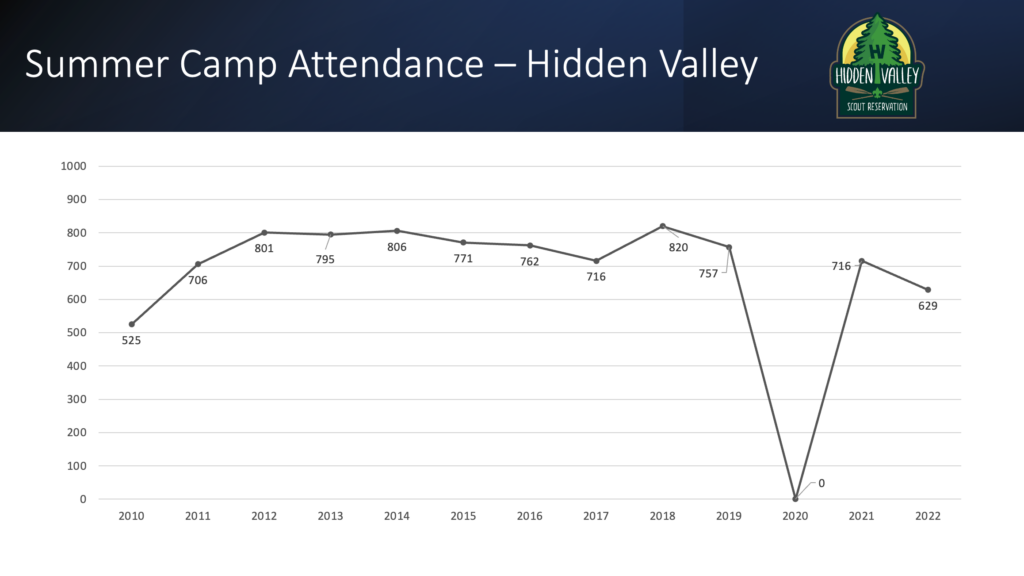 As you can see in the graph below, Tuckahoe’s summer camp attendance has declined sharply from a high-water mark of 2,629 in 2011 to 974 Scouts in 2022.
As you can see in the graph below, Tuckahoe’s summer camp attendance has declined sharply from a high-water mark of 2,629 in 2011 to 974 Scouts in 2022.
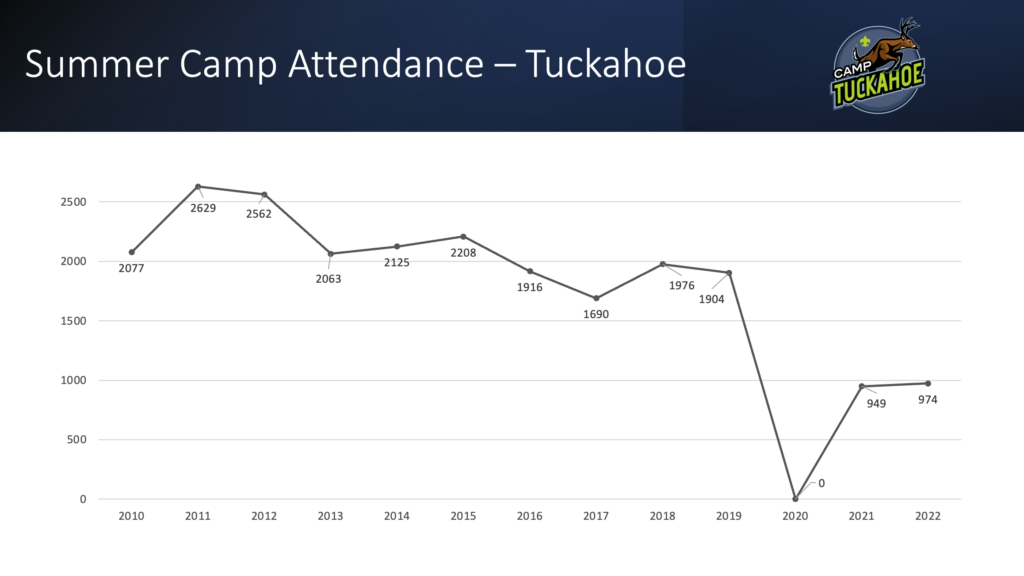 In addition to the pandemic’s impact, the fact that we had to harvest hundreds of diseased trees at Tuckahoe as a safety measure also contributed to this decline as units opted to camp elsewhere in the aftermath of that effort and its impact on the appearance of the camp.
In addition to the pandemic’s impact, the fact that we had to harvest hundreds of diseased trees at Tuckahoe as a safety measure also contributed to this decline as units opted to camp elsewhere in the aftermath of that effort and its impact on the appearance of the camp.
It will not surprise anyone to say that summer camp is critically important in covering the operating costs of the camp. We break camp operations into two periods for budgeting: 1) summer camp and 2) year-round. We do this even though we know that some operations at the camps in non-summer months support summer camp operations.
As you look at the graph below, summer camp surpluses at Hidden Valley trended mostly upward from 2010 to 2019. In 2022, the summer camp surplus was $11,766. This year, due mostly to significantly higher costs associated with hiring our summer camp staff, summer camp at Hidden Valley is budgeted to lose over $42,000.
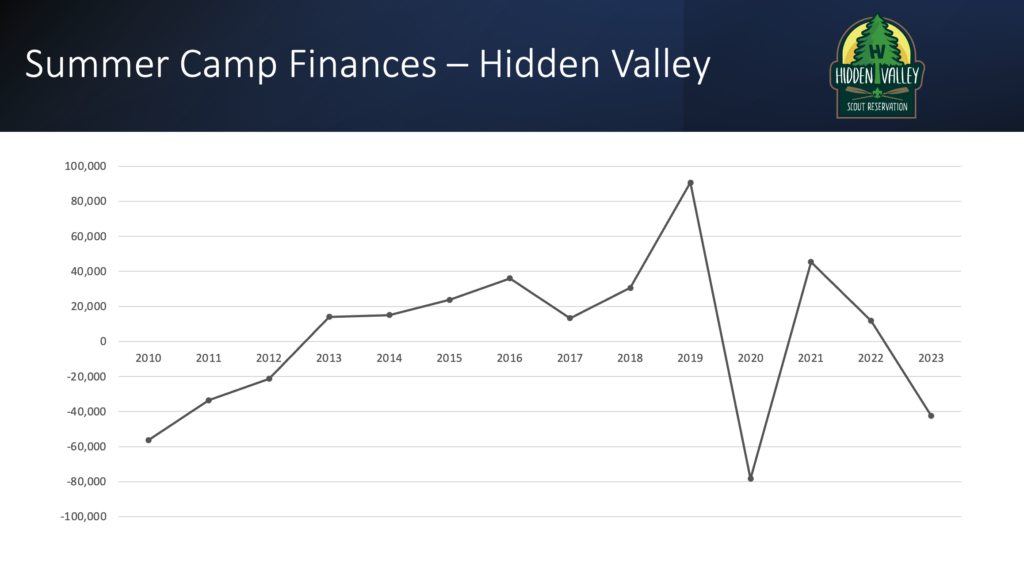 From 2010 to 2019, summer camp surpluses at Tuckahoe averaged well over $200,000 annually (see graph below). In 2022, that surplus was $28,419. The Council has also budgeted significantly more money to hire season staff at Tuckahoe in 2023, and our budget calls for a $53,000 summer camp surplus at Tuckahoe.
From 2010 to 2019, summer camp surpluses at Tuckahoe averaged well over $200,000 annually (see graph below). In 2022, that surplus was $28,419. The Council has also budgeted significantly more money to hire season staff at Tuckahoe in 2023, and our budget calls for a $53,000 summer camp surplus at Tuckahoe.
Between Hidden Valley and Tuckahoe, we have budgeted nearly $158,000 more than we spent last summer to hire summer camp staff. With the tight labor market and businesses everywhere competing for seasonal workers expecting much higher compensation, it will be much more expensive to field two full camp staffs in 2023.
Year-Round Camp Finances
Revenues from the non-summer camp months at our camps never cover the costs of those periods. In 2022 at Hidden Valley, the Council subsidized a $98,000 shortfall during year-round operations, and Hidden Valley is budgeted for a $113,000 shortfall this year (see graph below).
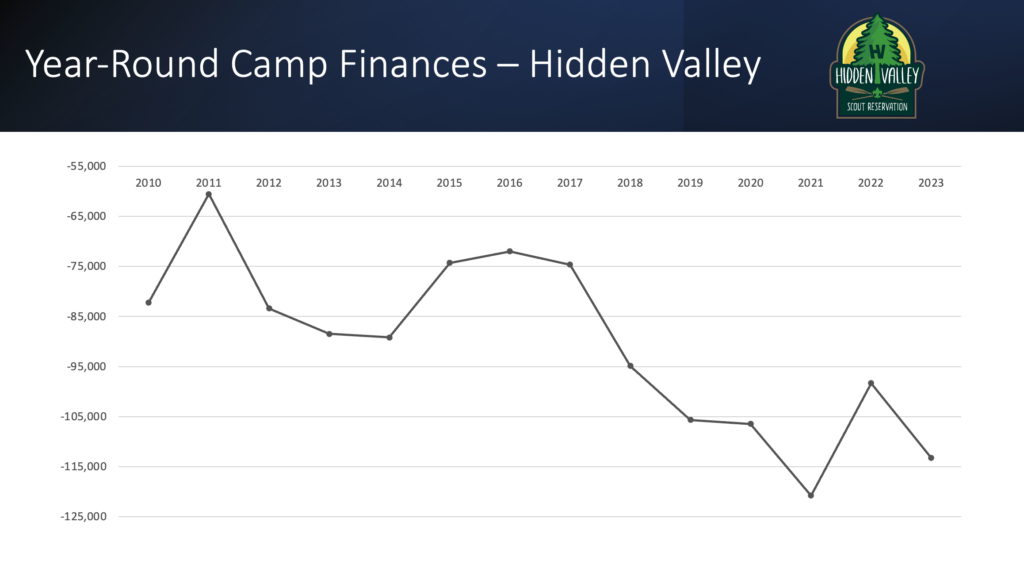 In 2022 at Tuckahoe, the Council subsidized nearly $126,000, and Tuckahoe is budgeted for a $139,000 shortfall this year (see graph below).
In 2022 at Tuckahoe, the Council subsidized nearly $126,000, and Tuckahoe is budgeted for a $139,000 shortfall this year (see graph below).
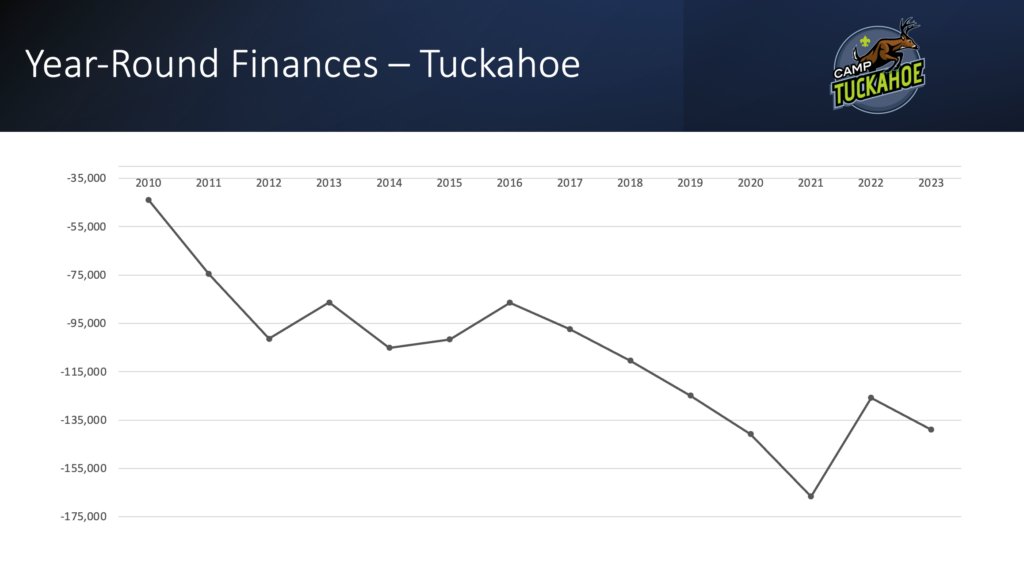 The Council’s operating budget could not compensate for the shortfalls at Hidden Valley and Tuckahoe, but that cash must come from somewhere. The cash was drawn from reserves built up in prior years. Those reserves are not unlimited, and using them to cover operating shortfalls at the camps means those reserves are not available for other purposes.
The Council’s operating budget could not compensate for the shortfalls at Hidden Valley and Tuckahoe, but that cash must come from somewhere. The cash was drawn from reserves built up in prior years. Those reserves are not unlimited, and using them to cover operating shortfalls at the camps means those reserves are not available for other purposes.
Looking ahead, robust participation and attendance at both camps are critical to ensuring that the camps are financially sustainable.
There’s one last chart we’d like to share with everyone, and it reflects the total financial impact – summer and year-round – for both Hidden Valley and Tuckahoe on the Council’s overall financial situation.
From 2010 to 2019, the Council’s camping operations produced a net surplus every year but in 2017. If we skip over the pandemic years of 2020 and 2021 and go straight to 2022, we had to subsidize $184,000 in operating our camps. With the additional monies the Board allocated to assist in hiring summer camp staff this year, we are budgeting to subsidize our camps by $241,000 in 2023 (see graph below).
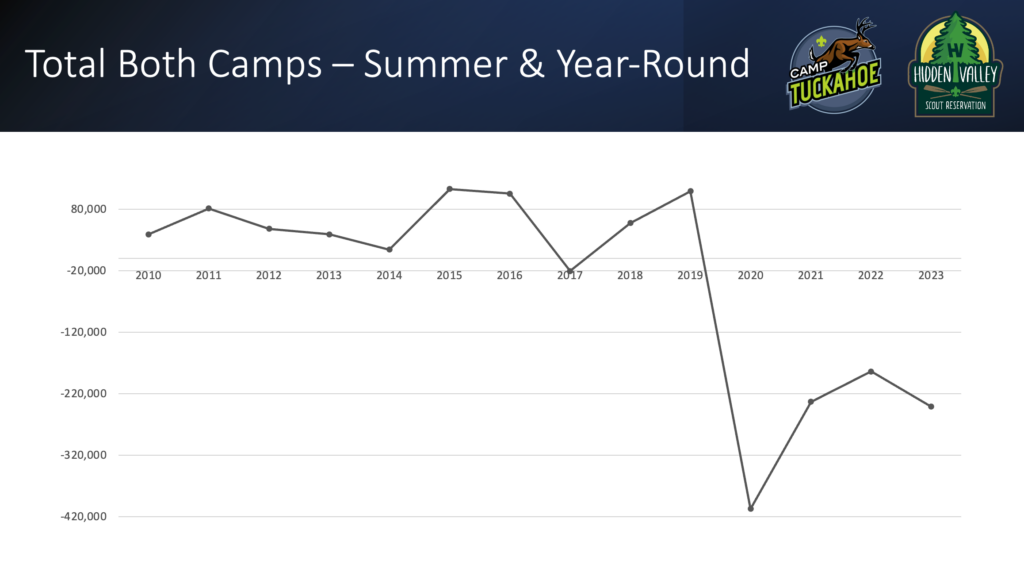 Key Takeaways
Key Takeaways
We know how important our camps are to our Scouts and volunteers. We can tell you that the members of our Board know this and feel the same way. But if the financial results we’ve shared with you here were playing out where you work or your household finances, the conclusion would be inescapable – this situation is unsustainable.
At this point, the Board has not decided anything about our camps. We plan to operate summer camp programs at both camps in 2024, and we hope everyone here will strongly consider summer camp options at Hidden Valley or Tuckahoe next year.
That’s not to say that nothing has changed. The Council’s 2023 budget called for eliminating the Assistant Scout Executive position. To look at this position another way, the Assistant Scout Executive is our Chief Operating Officer, whose responsibilities include supervising our field staff and most of our support staff. With that position unfilled, we’ve asked Ron Gardner, our Scout Executive, to pick up most of those responsibilities, with Brian DeBease, our Director of Development, assuming the lead role for our product sales. Eliminating this key position will save money but will not make our staff more effective.
In April, the Board was asked to approve an additional $60,000 for hiring summer camp staff. The Board then tasked Ron with eliminating $60,000 elsewhere to restore a balanced budget.
Right now, rebuilding our youth membership is paramount. We’ve lost too many Scouts and too many units. But to live within our financial means, we’ve had to make difficult choices to reduce our capacity to address the crucial need. Other difficult choices remain likely here in 2023 in efforts to achieve that $60,000 in cost savings.
While our camps and Council are all part of the same organization, we have seen our camping operation pivot from contributing positively to the Council’s overall bottom line to today, having to subsidize our camping operation by almost a quarter million dollars.
No one on the Board is happy about any of this. We know how much people care about Scout camps everywhere and our two local camps. But our fiduciary responsibilities as a Board are safeguarding and strengthening Scouting here in south-central Pennsylvania. We cannot close our eyes to our challenges and hope they will disappear.
We’ll look at ways to grow our membership and hope your unit will embrace that opportunity. More youth in Scouting means more Scouts available to attend our camps. We’ll look at ways to increase camping revenues, market our camps better, and become more efficient in how we spend money related to our camps. We’ll look at all of it.
We share all of this with you because we want you to know what’s happening in your Council, especially when our financial health is involved. That financial well-being is important to ensure we, as a Council, can be prepared to do what we must to support your units to deliver Scouting to the youth you serve.
Matt and I and our Board welcome input from everybody in our Scouting community with ideas on addressing these issues we’ve shared with you. We will be announcing a formal channel for providing those ideas in the near future.
Jan Wagner
Council President
Matt Haar
Immediate Past Council President
** Note – the United Way information was added to this online presentation to add additional context and was not originally shared at Program Launch.
 New Birth of Freedom Council, BSA Website for the New Birth of Freedom Council, BSA
New Birth of Freedom Council, BSA Website for the New Birth of Freedom Council, BSA
